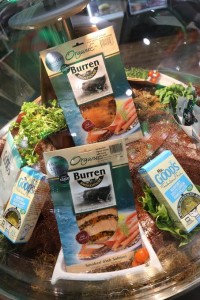New Bord Bia Research Highlights Attitudes Towards Food, Grocery Shopping and Cooking

New research from Bord Bia highlights Irish consumers’ changing behaviours and attitudes towards food, grocery shopping and cooking. Since 2001, Bord Bia’s biennial PERIscope study has been exploring consumer attitudes towards topics such as eating at home, cooking, local food, sustainability and health and wellbeing. PERIscope 2015 looks at eight markets – Ireland and Great Britain, four Continental European markets, along with the US and for the first time, China. In total, the research encompasses more than 8,000 respondents across these eight markets.
Paula Donoghue, Consumer Insight Manager, Bord Bia, comments: “This knowledge and consumer understanding in these countries is important for Irish food and drink exporters as they seek to increase their global footprint. Insight such as this assists companies to innovate, be future-focused and consumer driven in anticipating their changing needs. The real advantage of PERIscope is that we can track how attitudes have changed over the years.”
Report Highlights
Healthy eating continues to be a key focus, with Ireland ranking third out of eight countries in understanding the potential power of a healthy diet. Almost 9 out of 10 (87%) of Irish consumers regard their diet as fairly or very healthy and this figure is the highest for all eight countries surveyed. Increasing slightly from 2013, some 73% of Irish say they eat healthy to take control of our lives, while 79% of Irish people consider what they eat to be really important for their mental wellbeing. Interestingly, 7% of Irish people now have a nutribullet, 37% have a juicer and 31% have a smoothie maker. In the same vein, 49% of people have a steamer which is up from 34% in 2003 and deep fat fryers have dropped in ownership from 65% in 2003 to 42% twelve years later. Some 41% of Irish people claim to be following a balanced diet with 4% following a high protein diet at the moment.
Children’s health and the issue of childhood obesity is a growing concern for the majority of parents, with those in Spain, China and Ireland (52%, up from 31% in 2013) demonstrating most concern. Sandwiches, fruit and bottled water are the most popular items in lunchboxes. Juice has seen the biggest decline from 60% inclusion in 2009 to 34% six years later.
 Over half the population in each of the countries check for nutritional information on food, while a significant proportion claim to need help understanding it. The Irish are the least likely to check nutritional labelling at 55% versus China at 94%. In Ireland, 10% of households claim to have someone who has a food allergy which is up from 7% in 2011. The importance of transparency when it comes to food remains evident. The vast majority of all countries are confident that the food in the supermarket is safe. Meanwhile, 74% of Irish people sometimes or always check for country of origin on labelling or a quality mark symbol, further reinforcing the importance of transparency.
Over half the population in each of the countries check for nutritional information on food, while a significant proportion claim to need help understanding it. The Irish are the least likely to check nutritional labelling at 55% versus China at 94%. In Ireland, 10% of households claim to have someone who has a food allergy which is up from 7% in 2011. The importance of transparency when it comes to food remains evident. The vast majority of all countries are confident that the food in the supermarket is safe. Meanwhile, 74% of Irish people sometimes or always check for country of origin on labelling or a quality mark symbol, further reinforcing the importance of transparency.
The emphasis placed on price when grocery shopping seems to have fallen back slightly, with 60% of Irish people looking at price first when shopping and 77% of them saying quality of fresh food is more important.
 Local food goes hand in hand with the importance of scratch cooking, of back to basics and knowing where your food is coming from. Locally produced food is of particular importance in France, Spain and Ireland respectively while those in the Netherlands continue to remain disengaged from the concept of local food. Ireland is ranked third out of the eight countries for believing in buying local food to be important at 68%. Food that is made within a close proximity to where people continues to be the most universally acknowledged definition of local food across the countries.
Local food goes hand in hand with the importance of scratch cooking, of back to basics and knowing where your food is coming from. Locally produced food is of particular importance in France, Spain and Ireland respectively while those in the Netherlands continue to remain disengaged from the concept of local food. Ireland is ranked third out of the eight countries for believing in buying local food to be important at 68%. Food that is made within a close proximity to where people continues to be the most universally acknowledged definition of local food across the countries.
The Chinese are among the most frequent users of convenience meals, ready prepared foods and online shopping. According to PERIscope, 38% of Irish people claim to be too busy to cook as often as they like while only 13% of Irish have ever ordered grocery shopping online versus 71% of Chinese consumers. Some 66% of Irish people agree they are looking for quicker meals to prepare, up from 56% agreed in 2001.
The French get more enjoyment and entertainment through cooking and food than any other country. Consumers in Ireland appear to be eating out and socialising more often, but they are less adventurous in the foods they eat and the level of cooking expertise is among the lowest across all the countries. The Dutch claim to cook from scratch the most at 81% and while British do it the least at 64%, with Ireland only slightly ahead are at 68%.The Germans are still having the most fun cooking at 70% versus 36% of Irish who say they find it good fun or a passion.
However, Irish people continue to see the importance of eating as a family, using typical mealtimes to bring family together. Some 85% of respondents still believe it’s important to spend time over dinner as a family. The Irish are eating together more at the weekends but less on weekdays – on Sundays, 88% eat together up from 78% in 2001, while on weekdays, 54% eat together down from 59% in 2001. Irish people are making more time for breakfast as the number that says they rarely have time for breakfast is down from 44% in 2001 to 35%.
Across most countries, the awareness of environmental issues such as carbon footprint and sustainably produced continues to be quite high. The report states that 57% of Irish people believe they are more conscious of environmental issues in their choice of products, while 79% of Irish consumers are aware of both ‘food waste’ and ‘animal welfare’, terms included for the first time this year. Over half (54%) of Irish prefer to buy from companies that are aware of the impact of environmental issues.

































